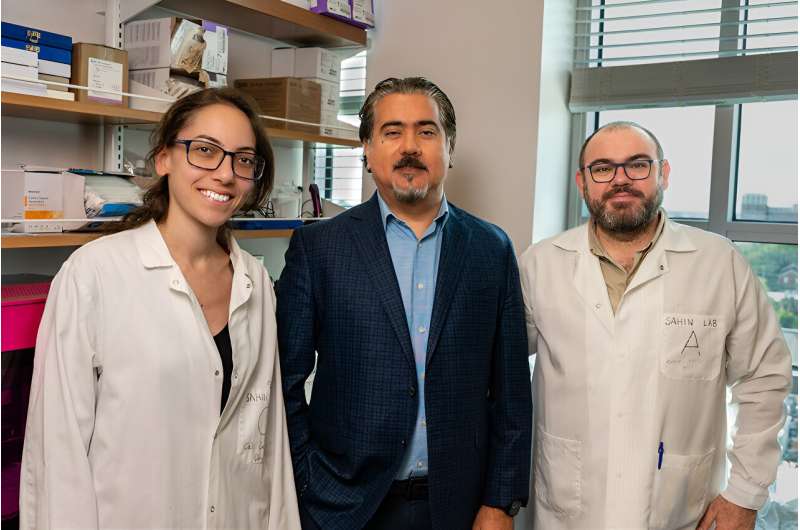
A new compound developed by researchers at MUSC Hollings Cancer Center shows promise in overcoming chemotherapy resistance in triple-negative breast cancer—and could potentially be applied to fibrotic conditions like liver fibrosis or pulmonary fibrosis.
At the center of this work is preventing the protein lysyl oxidase, or LOX, from going overboard in doing its job and, therefore, helping to produce a “stiff,” or desmoplastic, environment around tumors.
“The main function of this protein is to crosslink the collagens and elastins in the extracellular matrix (ECM) in the tumor microenvironment. These will basically provide stiffness around the cells, and this will prevent the penetration of drugs, including chemotherapy,” explained Ozgur Sahin, Ph.D., the SmartState Endowed Chair in Lipidomics and Drug Discovery in the Department of Biochemistry and Molecular Biology.
“By using a LOX inhibitor, you can open up this structure, make it softer and the drugs can penetrate better,” he said.
The Sahin Lab, in collaboration with other researchers at Hollings and at the University of South Carolina College of Pharmacy, published a paper July 22 in Cell Chemical Biology introducing the novel compound.
Sahin’s work had previously shown the key role that LOX plays in chemotherapy resistance.
Building upon that insight, his lab partnered with Campbell McInnes, Ph.D., medicinal chemist at USC and Peggi Angel, Ph.D., a Hollings scientist who uses proteomics to understand the molecular changes that prompt the reorganization of collagen, particularly in breast cancer.
These partnerships helped his team to go beyond typical tests, like measuring LOX activity in tissue.
“We also showed that we could change the architecture of the collagen using the MALDI-MSI, together with Peggi,” he said.
MALDI-MSI is a type of mass spectrometry imaging that allows researchers to see the physical layout of proteins and molecules within a sample.
“We collected the tumor tissue and analyzed the proteome with different mass spec approaches, and we could see that our inhibitor has a huge impact on the ECM, collagen and other structural proteins,” Sahin said.
By changing the architecture of the ECM to allow for better drug penetration, the LOX inhibitor enables the chemotherapy to stress the tumor into producing more reactive oxygen species (ROS) more effectively. At high enough levels, ROS creates DNA damage that can lead to cell death. Importantly, inhibiting LOX also blocks focal adhesion kinase (FAK) signaling, which would otherwise promote DNA repair. Taken together, these effects can overcome chemotherapy resistance. Further, these effects were found in different types of models, including triple-negative breast cancer cell lines, in vivo models and organoid models created from patient-derived xenografts.
Sahin’s research has focused on triple-negative breast cancer because this aggressive subtype has fewer treatment options than other types of breast cancer.
However, pancreatic cancer and kidney cancer are also highly stiff cancers that could potentially benefit from this inhibitor.
The team’s current frontrunner compound is stable and hasn’t shown signs of toxicity. However, the team will continue to refine it as they spend the next two or so years working toward an Investigational New Drug (IND) application with the U.S. Food and Drug Administration. Obtaining IND status would clear the way for clinical trials.
“In drug development, you never stop,” he said. “This one we identified is the current best option, but we know that there needs to be some optimization, like with every drug. In collaboration with USC, we are now producing new versions of this molecule and testing them in different biological and pharmacological assays.”
More information:
Metin Cetin et al, A highly potent bi-thiazole inhibitor of LOX rewires collagen architecture and enhances chemoresponse in triple-negative breast cancer, Cell Chemical Biology (2024). DOI: 10.1016/j.chembiol.2024.06.012
Citation:
Researchers mark milestone in progress toward investigational new drug for triple-negative breast cancer (2024, July 22)
retrieved 22 July 2024
from https://medicalxpress.com/news/2024-07-milestone-drug-triple-negative-breast.html
This document is subject to copyright. Apart from any fair dealing for the purpose of private study or research, no
part may be reproduced without the written permission. The content is provided for information purposes only.


